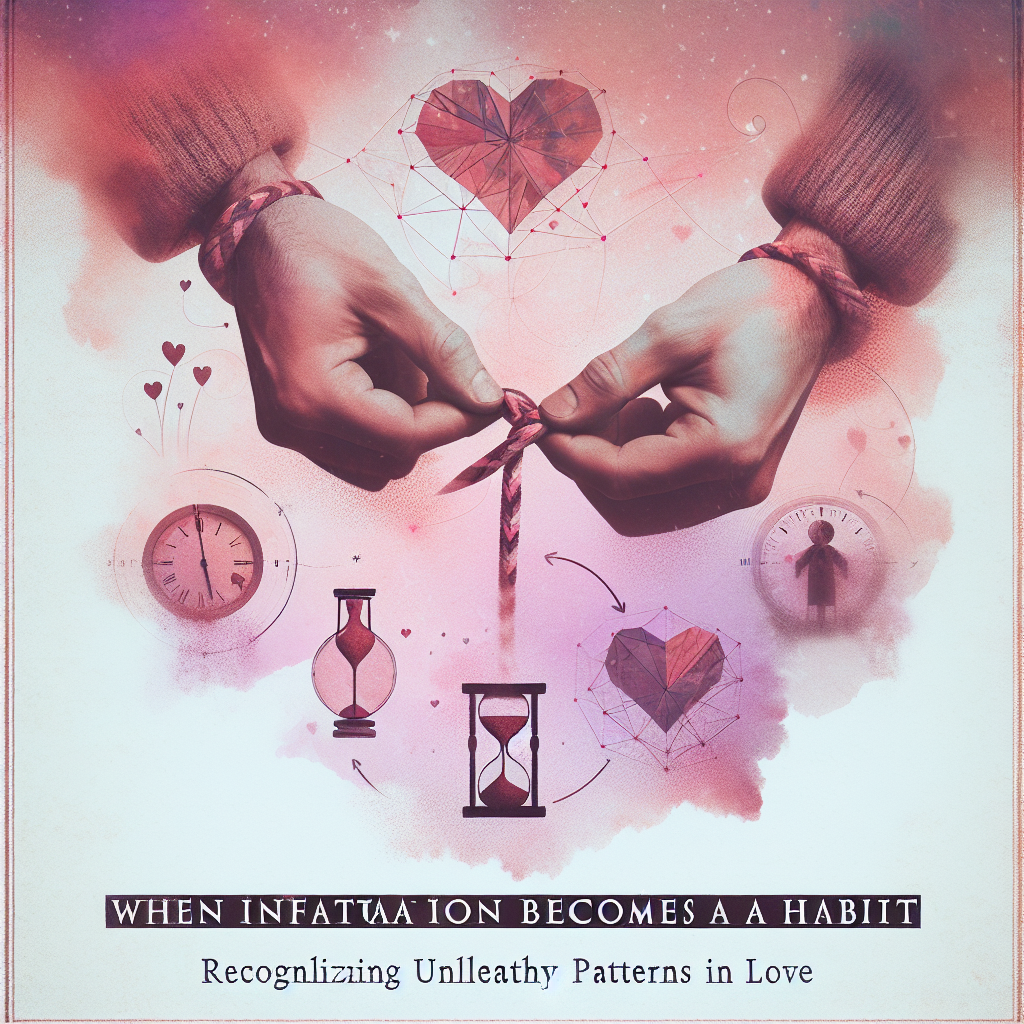Introduction: The Fine Line Between Love and Infatuation
Have you ever experienced that exhilarating rush when you first meet someone special? The butterflies, the endless conversations, and the electric chemistry can feel intoxicating. But what happens when that spark morphs into a compulsion, interfering with your sense of self and happiness? The journey from infatuation to obsession can be a slippery slope, leading to unhealthy patterns in love. Understanding When Infatuation Becomes a Habit: Recognizing Unhealthy Patterns in Love is crucial for navigating relationships healthily and sustainably.
Understanding Infatuation: The Early Stage of Love
The Science Behind Infatuation
Infatuation is a powerful, short-lived state of intense attraction. In psychological terms, it often stems from a chemical cocktail of dopamine, oxytocin, and adrenaline. These hormones create feelings of euphoria, making infatuation feel almost addictive. Most often, infatuation occurs in the early stages of a relationship, characterized by idealization of the partner rather than a realistic understanding of who they truly are.
The Shift From Infatuation to Habit
But as the initial fireworks fade, it’s vital to recognize when infatuation becomes a habit. This transition often entails:
- Obsession: Always thinking about the person and prioritizing them above everything else.
- Neglecting Self-Care: Ignoring your own needs, desires, or aspirations.
- Fear of Loss: An overwhelming anxiety that the relationship could end at any moment.
Recognizing Unhealthy Patterns
Signs That Infatuation Has Become a Habit
-
Constant Need for Reassurance: If you find yourself needing frequent validation from your partner, it may signal an unhealthy bond.
-
Social Withdrawal: Avoiding friends or activities you once enjoyed to be with your partner can indicate you’re losing yourself in the relationship.
- Emotional Turbulence: Experiencing extreme highs and lows based on your partner’s behavior is a common sign of an unhealthy relationship dynamic.
Case Study: Sarah and Mark
Sarah was infatuated with Mark after their first date. The initial excitement led to daily texts, late-night calls, and rapidly accelerated intimacy. However, as months passed, Sarah found herself constantly checking her phone and feeling anxious when Mark didn’t reply quickly. Her once-friendship with peers shifted; she ghosted her best friends, convincing herself that Mark was her everything.
Analysis: Sarah’s experience illustrates how infatuation can quickly morph into a habit, consuming an individual’s life and diminishing social connections. The emotional highs matched by lows created a cycle of dependency that proved detrimental to her mental health.
The Psychology of Infatuation
Why Do We Fall Into Unhealthy Patterns?
The roots of unhealthy patterns often lie in our psychological background—childhood experiences and attachment styles play significant roles. Those with anxious attachment styles may gravitate toward infatuation as a means of self-validation. Understanding these psychological roots is vital in recognizing when infatuation becomes a habit.
Common Attachment Styles and Their Impact
| Attachment Style | Characteristics | Influence on Relationships |
|---|---|---|
| Secure | Trusting, stable, communicative | Healthy, reciprocal relationships |
| Anxious | Clingy, constantly seeking reassurance | Tendency to form obsessive attachments |
| Avoidant | Dismissive of closeness, prefers independence | Struggles with intimacy and commitment |
| Disorganized | Chaotic, fearful of relationships | Conflicted; may oscillate between seeking and avoiding |
Strategies for Healthy Love
Build Self-Awareness
Recognizing unhealthy patterns begins with self-awareness. Reflect on your motivations for being in a relationship and identify unhealthy dependencies.
Foster Independence
Engage in activities that nourish your individual identity. Reconnect with hobbies and friends independent of your partner. Consider it a form of self-care crucial for a healthy relationship.
Communicate Openly
Discuss your feelings with your partner. Honest conversations help in demystifying anxieties and fears while reinforcing a positive relational foundation.
Seek Professional Help, If Necessary
Sometimes, the patterns are deep-rooted and require the guidance of a licensed therapist. Professional help can facilitate the exploration of why you may gravitate toward infatuation and guide you toward healthier habits.
Conclusion: Embracing Healthy Love
Love should enhance your life, not consume it. As you navigate romantic relationships, be mindful of the signs and the changes that signal when infatuation becomes a habit. By fostering independence, practicing self-care, promoting communication, and possibly seeking professional guidance, you can cultivate deeper, more meaningful relationships. Remember, the goal isn’t to eliminate infatuation; it’s to recognize it and ensure it doesn’t become the foundation of your love life.
Frequently Asked Questions (FAQs)
-
What is the difference between infatuation and love?
- Infatuation is often characterized by intense feelings and idealization, while love is deeper, built on mutual understanding and respect.
-
How can I tell if I’m in an unhealthy relationship?
- Look for signs like constant anxiety, lack of self-identity, and withdrawal from friends or family.
-
Is it normal to feel anxious in a new relationship?
- Some anxiety is normal, but if it becomes overwhelming or obsessive, it might indicate an unhealthy pattern.
-
Can infatuation turn into true love?
- Yes, but it’s crucial to transition through infatuation healthily, establishing a strong foundation for a lasting relationship.
- What should I do if I realize I’m stuck in a pattern of infatuation?
- Begin by reflecting on your feelings and motivations, engage in self-care, and consider discussing your emotions with trusted friends or a therapist.
By recognizing unhealthy patterns and leveraging strategies for healthy relationships, you can navigate the beautiful yet complex landscape of love with clarity and intention. The true essence of love lies not in infatuation but in genuine connection, understanding, and mutual support.
In this exploration of When Infatuation Becomes a Habit: Recognizing Unhealthy Patterns in Love, I hope you find not just insight but actionable steps toward fostering the kind of love that uplifts and empowers rather than consumes and diminishes. Let that be your guide as you embark on your romantic journey.

